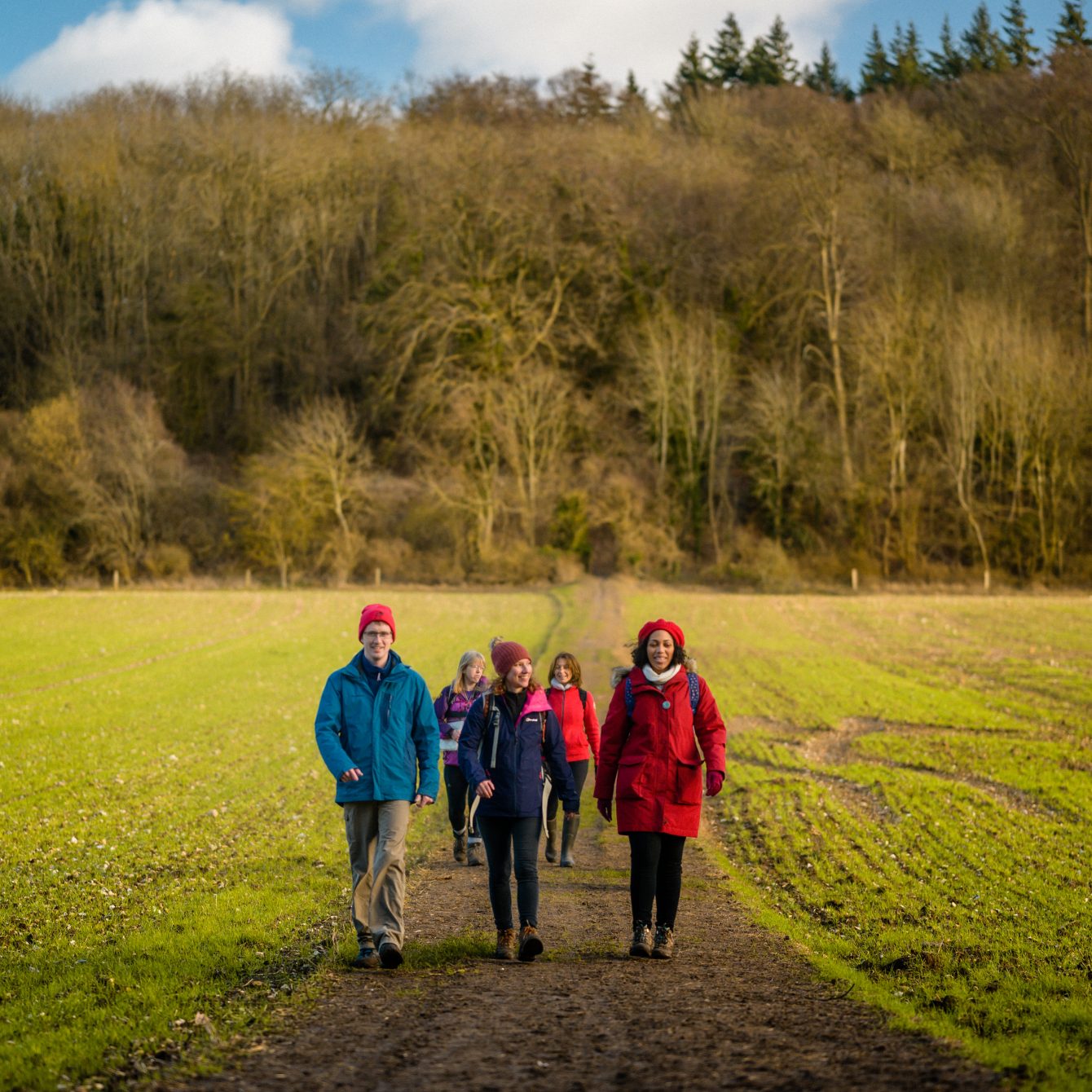Major new report by Britain’s walking charity, the Ramblers, highlights the staggering wellbeing value of our network of paths.
But not everyone is able to access them.
September 2023, London: Our network of paths [1] holds the key to significant physical and mental health benefits, a pioneering report published by Britain’s walking charity the Ramblers finds. Using established wellbeing valuation techniques, the charity has calculated that the network’s usage adds over 3,000 healthy years of life to the nation, worth an estimated wellbeing value of £2billion, over £33 per person in England and Wales [2] – the cost of 8.5 million ambulance call outs or nearly 10 million outpatient procedures [3]. However, the communities that would benefit most from greater access to nature are missing out.
The extensive report, commissioned by the Ramblers and written by the New Economics Foundation, breaks new ground in our understanding of the neighbourhood-level availability of paths and the critical infrastructure of nature access. For the first time ever, it has been made possible to analyse the correlations between where the path network is with national-level data sources on the environment, socioeconomics, and health to better understand the value of the network to people and places.
The report also explores the topic of who has access to these paths; the conditions that some paths are in; and the Ramblers recommendations on what actions might best expand the social and health benefits that walking in nature brings. If sufficient awareness is raised of these issues the impact of this research, the charity says, could provide a wealth of positive change; providing greater walking opportunities for all and in turn, improved health and social outcomes.
What’s the issue?
Equality, the report finds, is a key issue in unlocking the path network’s potential to create change in a population whose health is declining [4]. The Ramblers’ findings conclude that the old, the wealthy, the healthy, and the white have the greatest provision of paths in England and Wales, with residents of the most affluent areas of England and Wales enjoying 80% more paths in their local area than the most deprived.
The gap widens even further when looking at the ethnicity divide, where the most white-dominated areas have 144% more local paths than the most ethnically diverse.
Strengthening the case for the importance of this network, the report finds that where health is worst (as indicated by heart attack prevalence) the number of paths is also lowest.
Furthermore, the most deprived communities in England and Wales would have around 63% more paths in their local area today if all public paths had been accurately registered in legal records from the 1950s onwards.
How could this be improved?
The Rambers’ analysis suggests that doubling the average length of paths in neighbourhood would result in an additional annual 78.5 million walks in nature across England and Wales. This is because the more paths people have close to home, the more likely they’ll go for a walk and be able to enjoy the health and wellbeing benefits of being active in nature.
The report documents solutions which might redress the imbalances in availability and access to the path network; such as connecting up existing routes, creating green urban corridors, and restoring lost rights of way.
Through detailed analysis techniques, the report authors have calculated a need for the governments [5] to invest an additional £650 million annually into expanding the path network and creating more equal access to nature. This figure may seem a tall order in today’s cost of living crisis, but the investment would bring the path network to its full potential – which would be worth far more that its current wellbeing value of £2 billion a year – and improve Britain’s health by opening up access to the outdoors for underserved communities.
Action for change
The Ramblers commissioned a YouGov conducted online poll between 9th-17th March 2023 (Total sample 4,824 UK adults aged 18+ (out of which 1734 UK adults, 1061 Welsh adults, 1018 Scottish adults and 1000 respondents with physical and sensory disabilities). The survey found that 71% of people surveyed think more time, money and resource should be invested in the path network, and this latest piece of research by the charity goes deeper into finding a solution to help preserve this national asset.
The Ramblers identify three key actions needed to right the inequities in access, availability and condition of the paths network, aiming to reverse the erosion of this core component of our national, critical infrastructure:
- Legally record what infrastructure we can, protecting and reinstating historic rights of way for future generations.
- Protect what infrastructure we have, preventing loss to poorly planned development, blockage, or decline into disrepair.
- Expand infrastructure and target it where we need it most, raising significant investment in new paths and open access land in those communities currently cut off from nature.
Jack Cornish, Head of Paths for the Ramblers says: “This research has shown that governments are missing an open goal. It’s clear that availability of paths close to people’s home has a massive impact on health outcomes – but at the moment it’s the old, the healthy, the wealthy and the white that are primarily enjoying the benefits. Others, often from more deprived areas or underserved groups, are missing out. This is not a problem that’s insurmountable. This report lays out what needs to happen and the Ramblers is calling for the investment needed to bring paths to their full potential, so they can benefit every one of us”
The Ramblers, which campaigns for equal access to the outdoors and creates walking opportunities for all, hopes that through this research, more people will understand how valuable Britain’s path network is – and could be – with the help of both individuals and the governments. The charity is calling for support to help enhance this national asset, making it more accessible for more people to enjoy and gain health benefits from. Visit www.ramblers.org.uk/paths or follow on social media to learn about what the Ramblers do, and how you can get involved.
For more information, case studies, imagery, spokespeople or to access the report summary, please contact Aspire PR: ramblers@aspirepr.co.uk
[1] Across England and Wales there are over 140,000 miles of public rights of way. These are paths on which we all have the right to walk. Most rights of way run across private land, but they are open to the public. Public rights of way make up the majority of the path network, but there are also permissive paths where there are no legal rights to walk these paths, but permission will have been granted by the landowner
[2] Figure derived using established wellbeing valuation techniques
[3] Source: National Cost Collection for the NHS
[4] Research by the British Medical Journal
[5] The UK Government, Welsh Government and Scottish Government.
About the Ramblers
The Ramblers is Britain’s walking charity. We open the way so everyone can get out and go walking – in towns and cities, through fields and forests, along coastlines or mountaintops. Across Britain, we break down barriers that stand in the way and give more people the opportunity to walk. The Ramblers acts to protect paths and ensure they are properly registered as public rights of way; working to save thousands of miles of paths that could be lost forever through our Don’t Lose Your Way campaign. All year round, teams of Ramblers volunteers keep paths clear and well-maintained for more people to enjoy. This includes putting up waymarks to help walkers know they’re sticking to the right path. Last year the Ramblers volunteers organised 40,000 group walks and our partners organised 30,000 short health-focused walks called Ramblers Wellbeing Walks. These walks helped over 136,000 people experience the pleasures of walking and spend time in green spaces, connecting with nature.












